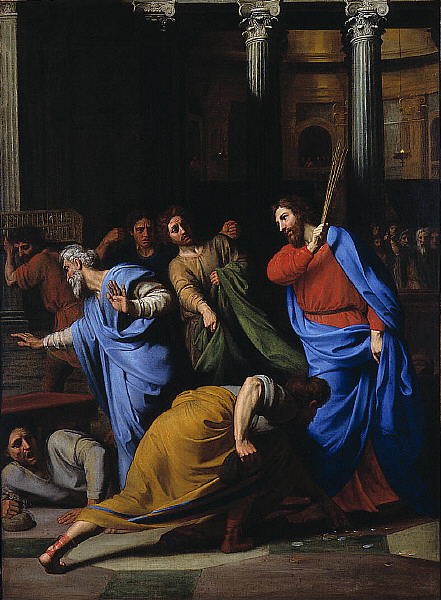There are some things about
which it is right to be outraged.
And then there’s football. One
can be rightly dismayed or genuinely livid at some aspects that surround the game – say, like the
thoughtless deaths of innocent immigrant workers in Qatar to fund a
tournament that may or may not have been “bought” by the host nation – but if
the way one team plays football plays havoc with your morality-meter, then we’ve
you’ve got a problem.
 |
| Christ's righteous anger. Not it was not directed at Big Sam. Courtesy: wikipedia |
Let’s examine two basic facts
about the (or, indeed, any) sport:
- Often, there is a skill gap between two competing teams.
- Winning is generally more enjoyable than losing.
The dichotomy of the two truths above
is bridged by a concept called “tactics”. They allow teams at a disadvantage
(in talent, location, health or mindset) to try their best to win.
Such an event took place on
Sunday at Anfield. Jose Mourinho, the Chelsea
manager, sent his men out to negate the opposition, the irrepressible force of Liverpool and was described as “parking
two buses”, first by his opposite number and subsequently by fans and
several media sources.
While it made the game stodgy and
barely digestible for some, the results suggest that
Mourinho made the right decision. Liverpool are better at attacking than Chelsea are, and probably
worse at defending. To make sure his team had their best shot at winning a
critical game, the manager played to his strengths and his opponents’ underbelly.
Aesthetic? Not unless you have
particular tastes.
Pleasing for the Chelsea players, staff and support? Totally.
There is no “right” way to play
football. (Unless an outfield player is batting the ball with their hands. That
is, actually, wrong). Kicking the ball repeatedly upfield to a contest, or
favouring compressive defence over expansive offence is not wrong, it’s just an
opinion on how best a team can maximise their chances of winning a weighted
contest.
The way a team plays football is
a product of their tactics (or lack thereof). Each team has an obligation – and
hopefully the desire – to maximise their chances of winning a match. It may be
that one team’s singular strength is in negating another team’s singular
strengths, which might make the game less pleasurable to watch. Welcome to football in the modern era.
In no way should the tactics of
football be the subject for a temple-cleansing righteous anger. If you get
morally uptight at the very thought of quote-unquote-anti-football, then maybe
it’s time that you concentrate your energies on something else – football’s too
lighthearted for you.
If watching the way that Stoke City ,
Chivas USA
or the Socceroos go about their business makes you angry, then don’t watch. It
really is that simple. Football is game and the playing thereof doesn’t deserve
anything but interest. There are far better outlets for moralisation.




